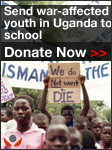No home, no rice, no mirror
I am officially reaching my hotel limit and am craving a home. Aside from the fact that I am living out of my bags - and for two months now - and unable to really establish myself, I am going stir crazy. As opposed to Rwanda or if I was in Kampala, Gulu has yet to provide me with an outlet to release my compounding energy. There is not a pool or lake to go swimming in, no gym, no mountain to climb. People keep warning me about security, so I am not even walking that much. I suppose I could make a spectacle of myself in town (I already do that anyway) and run, however the knee factor kicks in. This evening after work I was so craving cardio activity that I went on a power walk up to the stadium, hoping that despite the fact that I have never played soccer in my life that some kids might be playing around. There was some soccer action, but only young men, looking like they were attempting to train. So I pathetically had to return to my little room, do some jumping jacks and stretches, but I resolved that I would try to organize some sort of sporting activity for women in town. If not for them, for me!!
I think my physical inertia is compounded by the cuisine. Aside from matoke and millet, chicken and chips is the primary cuisine. Tonight I was excited when I was told this restaurant could at least give me rice with chicken, but when my plate arrived, sure enough it was chicken and fries. I crave rice, beans, anything that isn’t fried! I can sometimes find beans or rice in isolation, but never together. Even the fish is fried to a crisp. I was sad walking through the wonderful market today because there were so many veggies, fruits, and other foods I would buy and cook for myself if I only had a home. At the very least, I cannot complain about the price: last night I had some semblance of fish, a bowl of beans, a bottle of mineral water and two cups of tea for $1.20. And hey, tonight as I was eating I got to hear “We Are the World”.
As my “hotel” lacks mirrors, I have been going without seeing my reflection - I managed my contacts and whatever else just fine. Then this morning I felt some strange burning bumps on my neck and collarbone that were seriously irritated. After trying to get my reflection in the metal of my fan, I promptly asked one of the hotel people if they could scrounge up a mirror for me. I handed him about 60 cents and the guy returned with a hand mirror and I was able to see that I either got some wicked bites or I missed a few small spots with sunscreen and they have blistered in a strange way – I just can’t tell. Terrific. I was giving up on mosquito nets (I hate sleeping with them), but maybe I should reconsider. Another tidbit: as in Rwanda, people are curious about my freckles. While nobody has looked upon me in complete disgust and ask if my “spots” are an infection as one woman did in Rwanda, people still inquire. Many think they are from the African sun. Ok, I know this isn’t so interesting to read, but certainly a part of my Gulu existence.
David, the child I mentioned before, who I had met on the street found me again today. I am still not quite sure how to handle these children because he approached me (Kelly, it’s me David), telling me he had not eaten in two days and that another boy was angry with him for losing some money. I was firm with him that I could only help him today and that he would have to find a program (and I myself am looking for one) that will help get him in school and fed. But I couldn’t refuse him so I bought him some juice and sent him with a small bit of money.
Ok, I have now spent an hour attempting to find a way to get a picture on here. I give up and will attempt to send to one of my techy peeps (you know who you are).
But enjoying work and being back in Africa! And just an FYI, if any of you want to ever comment on my postings, please feel free to do so. You have the freedom to post comments to my blog site, so take advantage. It is good for me to know you are out there.

